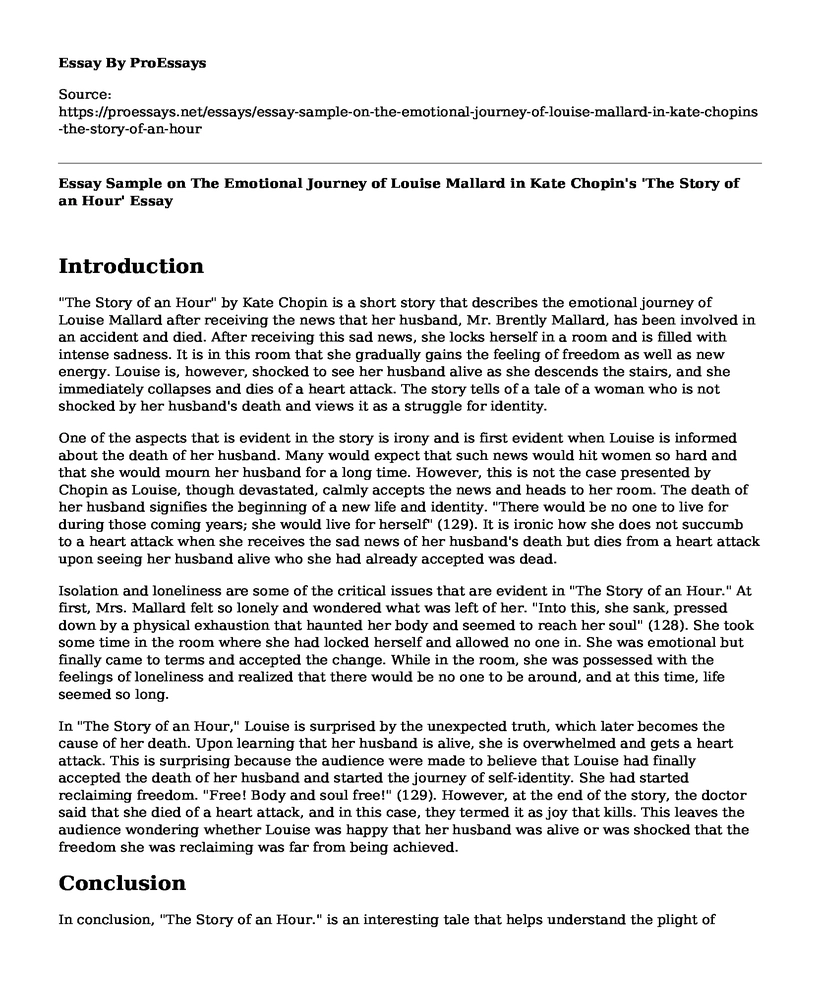Introduction
"The Story of an Hour" by Kate Chopin is a short story that describes the emotional journey of Louise Mallard after receiving the news that her husband, Mr. Brently Mallard, has been involved in an accident and died. After receiving this sad news, she locks herself in a room and is filled with intense sadness. It is in this room that she gradually gains the feeling of freedom as well as new energy. Louise is, however, shocked to see her husband alive as she descends the stairs, and she immediately collapses and dies of a heart attack. The story tells of a tale of a woman who is not shocked by her husband's death and views it as a struggle for identity.
One of the aspects that is evident in the story is irony and is first evident when Louise is informed about the death of her husband. Many would expect that such news would hit women so hard and that she would mourn her husband for a long time. However, this is not the case presented by Chopin as Louise, though devastated, calmly accepts the news and heads to her room. The death of her husband signifies the beginning of a new life and identity. "There would be no one to live for during those coming years; she would live for herself" (129). It is ironic how she does not succumb to a heart attack when she receives the sad news of her husband's death but dies from a heart attack upon seeing her husband alive who she had already accepted was dead.
Isolation and loneliness are some of the critical issues that are evident in "The Story of an Hour." At first, Mrs. Mallard felt so lonely and wondered what was left of her. "Into this, she sank, pressed down by a physical exhaustion that haunted her body and seemed to reach her soul" (128). She took some time in the room where she had locked herself and allowed no one in. She was emotional but finally came to terms and accepted the change. While in the room, she was possessed with the feelings of loneliness and realized that there would be no one to be around, and at this time, life seemed so long.
In "The Story of an Hour," Louise is surprised by the unexpected truth, which later becomes the cause of her death. Upon learning that her husband is alive, she is overwhelmed and gets a heart attack. This is surprising because the audience were made to believe that Louise had finally accepted the death of her husband and started the journey of self-identity. She had started reclaiming freedom. "Free! Body and soul free!" (129). However, at the end of the story, the doctor said that she died of a heart attack, and in this case, they termed it as joy that kills. This leaves the audience wondering whether Louise was happy that her husband was alive or was shocked that the freedom she was reclaiming was far from being achieved.
Conclusion
In conclusion, "The Story of an Hour." is an interesting tale that helps understand the plight of women in the 1900's when they are expected to abide by the rules of men. This explains why Louise had mixed emotions after receiving the news of her husband's death. She was devastated, but after a short while, she calmed down and welcomed the thoughts of freedom. She, however, dies upon realizing that her husband was alive.
Works Cited
Chopin, Kate. The story of an hour. Joe Books Ltd, 2018.
Cite this page
Essay Sample on The Emotional Journey of Louise Mallard in Kate Chopin's 'The Story of an Hour'. (2023, Apr 10). Retrieved from https://proessays.net/essays/essay-sample-on-the-emotional-journey-of-louise-mallard-in-kate-chopins-the-story-of-an-hour
If you are the original author of this essay and no longer wish to have it published on the ProEssays website, please click below to request its removal:
- Literary Analysis Essay on "The Knight's Tale" by Geoffrey Chaucer
- Literary Analysis Essay on Maya Angelou's Poem, "Still I Rise": A Fight for Justice
- Essay Sample on Medusa as a Powerful Creature
- Literary Analysis Essay on Wife of Bath's Prologue and Wife of Bath's Tale by Geoffrey Chaucer
- Poetry Analysis Essay on My Doggy Ate My Homework: A Tale of Amazing Dogs
- The Lottery: Shirley Jackson's Tale - Literary Analysis Essay
- Essay Sample on Othello: Love, Hate, & Tragedy in Shakespeare's Classic Play







